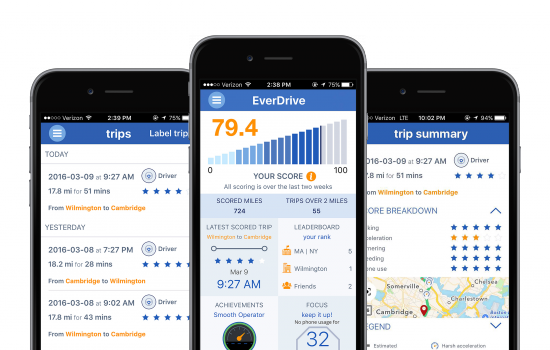It’s a question that’s been debated as long as Bostonians and New Yorkers have existed - who are worse drivers?
Thanks to a new app, we may finally get an answer.
This month marks the launch of the mobile app EverDrive, which measures users’ driving habits like speeding, acceleration, hard turning, harsh braking and phone distractions. It can then deliver personalized tips and show users how they compare to friends, family and other drivers.
EverDrive is launching via a promotion aimed at stoking an age-old rivalry: between now and June users in Massachusetts and New York will compete for $50,000 in cash, including a $10,000 grand prize awarded to the user with the safest driving rating. In June the app’s developers will announce which state is home to the most reckless drivers.
The app was developed by auto-insurance platform EverQuote alongside Cambridge Mobile Telematics (CMT), a spin-off of MIT’s Computer Science and Artificial Intelligence Lab (CSAIL) founded by professors Hari Balakrishnan and Sam Madden.
“EverDrive puts our work in mobile sensing, machine learning, and behavioral science directly in the hands of drivers and encourages improvement through awareness and incentives,” says Balakrishnan. “Our mission is to make roads safer by making drivers better.”
Can cellphones actually improve driving?
According to the National Highway Traffic Safety Association (NHTSA) statistics, more than 90 fatalities and 6,405 injuries per day in the United States are due to vehicle crashes. The World Health Organization estimates that, without action, traffic accidents could become the seventh leading cause of death worldwide (moving from ninth) by 2030.
Things are particularly bad in Massachusetts: a 2015 study suggested that drivers in Boston are the worst in the country and 157% more likely to get in an accident than the average driver.
CMT’s early evidence suggests that its algorithms could help. A pilot program in South Africa last year found that, within two weeks, unsafe speeding among the app’s riskiest participants dropped by 40 to 50 percent. Participants also cut down their hard braking, cornering, and phone usage incidents by half.
“The app helped drivers improve; the data shows that drivers with low scores [below 50] improved by 40 percent in just two days. This shows that safe drivers are made, not born,” Balakrishnan told MIT News.
